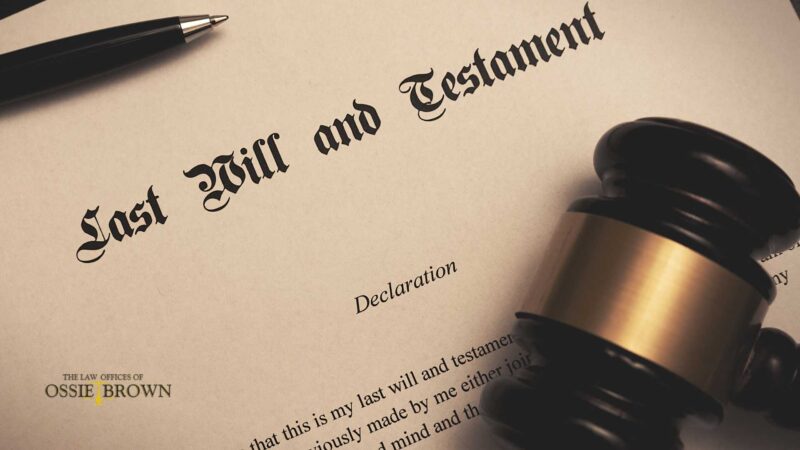Testate vs. intestate in Louisiana refers to whether a decedent passed with a valid will in place or without a last will. In a testate succession, the decedent’s legally binding last will and testament directs how to distribute assets and property according to their estate plan. However, if a person dies without a valid will, or they die intestate, assets distributed among heirs is done so according to Louisiana intestate succession laws.
If you want your assets distributed a certain way, you’ll need to create a valid will with an experienced estate planning attorney.
With a deep understanding of Louisiana’s intestacy laws and extensive experience with intestate estates, the Baton Rouge estate planning attorneys at the Law Offices of Ossie Brown can help you create an effective estate plan. Call 225-343-1111 to get started.
What is Testate Succession in Louisiana?
Testate succession refers to the process of distributing a person’s assets and property upon their death when they have left behind a legally valid will. In Louisiana, creating a last will and testament allows individuals to outline their wishes regarding the distribution of testate estates, including which family members or friends should receive the testate inheritance.
Put simply, who should inherit their assets, how debts should be settled, and who will be responsible for carrying out these instructions as an executor or personal representative of the testate inheritance.
Louisiana Inheritance Laws With Will
In Louisiana, when a decedent passed with a valid will, the entire estate is handled as a testate estate, where Louisiana state law governs the testate succession process. For a will’s validity to be upheld, the will must be legally binding and meet specific requirements set by Louisiana state law. If not, it may be deemed unenforceable by the probate court.
In a testate estate, beneficiaries named in the will inherit the personal property and assets as specified, rather than default rules applying to close relatives. However, if multiple heirs are involved, the probate process ensures that the testate estate’s assets are properly divided. Most wills are designed to address potential estate taxes and may outline strategies to avoid paying unnecessary estate taxes. Louisiana testate estates allow individuals more control over their legacy, ensuring that their wishes are respected and their property is distributed according to their intentions, even in cases involving multiple heirs.
Forced Heirship and Forced Portion
Louisiana state law includes a unique rule known as forced heirship, which applies specifically to testate estates. Under forced heirship, certain close relatives, particularly descendants who are minors (under age 24) or adult children who are permanently incapacitated, are legally entitled to a portion of the decedent’s estate, regardless of the provisions in the valid will.
This state law mandates that a specified portion of the estate (called the “forced portion”) be reserved for these forced heirs.
Can You Inherit Debts From a Testate Estate?
When a deceased person leaves a testate estate, their debts do not automatically pass to the beneficiaries or heirs. However, all debts must be settled before any assets are distributed to the beneficiaries. The personal representative or executor is responsible for using assets to pay off debts, which include final medical bills, loans, and other debts.
If the debts exceed the estate’s assets, then only the estate’s available funds are used to cover debts, and the beneficiaries will inherit whatever remains if anything. An effective estate plan helps clarify how other debts should be prioritized under estate law and may offer strategies to prevent debts from affecting the heirs’ inheritance.
Exceptions to Testate Estate Law in Louisiana
Testate inheritance follows unique rules under Louisiana state law that affect how certain assets in a person’s estate are distributed, often regardless of the will’s validity or instructions. As a community property state, Louisiana requires that marital assets (assets and real property acquired during the marriage) are typically split evenly between the spouse and the decedent (or is subject to the terms of the last will and testament). Non-marital assets (such as personal property acquired before the marriage or through inheritance) are not affected by this rule and are distributed solely according to the will’s terms.
Exceptions also include situations involving evasion, a more common form of tax fraud.
Additionally, Louisiana has a forced heirship requirement, which mandates that a portion of the estate be reserved for children under 24 or permanently incapacitated adult children, ensuring that these certain assets are inherited by them regardless of the will’s provisions. This forced heirship applies to both real property (like land and houses) and assets (such as bank accounts and personal belongings) within the person’s estate.
The personal representative or executor is responsible for honoring the rules for marital assets and forced heirship to ensure the estate plan complies with Louisiana state law with testate succession.
What is Intestate Succession in Louisiana?
Intestate succession in Louisiana is the process used to assets of a decedent when they die intestate—that is, without a legally binding valid will. When a decedent dies intestate, Louisiana intestacy laws dictate how the intestate estate is divided among beneficiaries according to a strict order, beginning with close family members.
So, what exactly does dying intestate in Louisiana mean for family members?
In intestate estates, the intestate inheritance rules prioritize surviving spouses and children, who receive pro rata shares depending on the estate’s size and structure. If the deceased person has no immediate family members, intestacy laws allow more distant relatives, like first cousins, to have the intestate inheritance.
When looking at testate vs intestate in Louisiana, unlike wills, which enable a decedent to specify their wishes, an intestate estate in Louisiana means the court determines the distribution of assets based on predetermined guidelines. This process is complex, especially for intestate estates that involve community property, and often requires careful court oversight to manage family claims.
Which Assets Are Affected By Intestate Succession Laws in Louisiana?
Intestacy laws in Louisiana apply to various types of assets, including:
- Those you may have transferred into a living trust,
- The proceeds from life insurance policies designated with a specific beneficiary,
- Funds held within investment accounts like IRAs or 401(k)s with named beneficiaries,
- Securities housed in transfer-on-death accounts,
- Real property or land governed by transfer-on-death deeds,
- Vehicles registered with transfer-on-death arrangements,
- Bank accounts with payable-on-death designations,
- And personal property owned jointly with another individual under joint tenancy or tenancy by the entirety.
Understanding how these assets are impacted by intestate succession laws helps many people create an estate plan before they pass to avoid an intestate inheritance for their surviving family.
What Happens if You Die Without a Will in Louisiana?
When a person dies without a will in Louisiana – which is referred to as dying intestate – the estate’s remaining assets are distributed according to the state’s laws of intestate succession. The distribution hierarchy if the decedent dies intestate typically starts with their marital partner and descendants, followed by other family members in a specific order.
How Louisiana Probate Court Decides Who Gets What Assets When There’s No Will
When someone dies intestate with no will, Louisiana probate courts follow a predetermined hierarchy to determine how the assets within the intestate estate are distributed. Here’s a simplified overview of the hierarchy:
Surviving Spouse and Legal Descendants
Surviving spouses inherit the entire estate if there are no descendants.
In cases where both spouses and descendants are living, descendants inherit the decedent’s share of the community assets in naked ownership, meaning they own it but cannot use it. Spouses will retain usufruct over the community assets, allowing them to use and benefit from them until they pass away or remarry.
In terms of separate property (property the deceased owned before the marriage or received as an inheritance or gift), descendants inherit it entirely. If there are no descendants, surviving spouses may inherit separate property.
In situations where there are descendants but spouses have passed, the descendants inherit the entire estate, divided equally among them.
Surviving Parents, Surviving Siblings, and Distant Relatives
- If there are no surviving spouses or descendants, the surviving parents of the deceased inherit the estate equally if both are still living.
- If there is no surviving spouse, descendants, or parents, the estate is divided equally among the deceased’s surviving siblings or their descendants if a sibling has predeceased.
- If there is no surviving spouse, descendants, parents, siblings, or their descendants, more distant relatives may be entitled to inherit the estate under Louisiana’s intestacy laws.
Exceptions to Intestate Estate Law in Louisiana
The primary exception regarding intestate estates pertains to spouses. In most cases of intestate inheritance, a surviving spouse may typically inherit all assets not categorized as marital property.
However, the Uniform Probate Code delineates specific exceptions for other heirs of a person’s estate, including parents and descendants. This becomes especially significant when considering situations involving non-biological children who have no blood relation to the surviving spouse in intestate succession.
In most states, the farthest degree of familial separation that still allows inheritance from an intestate estate is typically limited to first cousins. However, if someone died intestate without naming any living heirs, their assets ultimately go to the state. Again, this fact underscores the importance of creating an estate plan with a qualified estate planning attorney to ensure the desired distribution of one’s real property and assets.
Testate vs. Intestate Succession in Louisiana
The main difference between testate vs intestate estates in Louisiana lies in whether or not a person has a legally valid last will and testament at the time of their death.
Testate succession allows individuals to dictate how their assets are distributed and who the beneficiaries should be within the legal constraints of Louisiana’s unique legal system.
In contrast, when someone dies intestate, they rely on predetermined rules and hierarchies to distribute assets when there is no valid will in place.
It’s important to note that both testate and intestate succession have their advantages and disadvantages, and the best approach depends on an individual’s specific circumstances, family dynamics, and financial situation.
A Baton Rouge estate planning attorney can help you walk through the complex estate planning process so that your remaining assets are squared away.
Baton Rouge Estate Planning Attorneys
Navigating the complexities of estate planning in Louisiana, whether through testate or intestate succession, can be a challenging and emotionally charged process.
Our attorney team has extensive experience with probate and estate planning in Louisiana. We understand the intracacies of Lousisiana estate planning laws and are committed to ensuring your last will and testament is solid.
Don’t leave the fate of your estate to chance. Contact the Baton Rouge estate planning attorneys at 225-343-1111 today for personalized and professional legal guidance.






